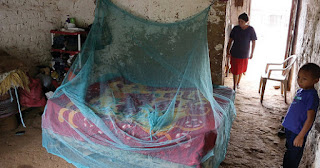FIGHTING MALARIA AT THE RURAL AREAS
In sub-Saharan Africa, we have the greatest problem of malaria as 3000 children under five years old die of malaria every single day. Although globally, around 40% of the population is at risk of malaria (http://www.who.int/features/2005/malaria/en/).
Ending Malaria for good at the rural areas must begin by understanding the thought processes of the rural dwellers. An average rural person wakes up with the thought of how to feed his/her family first. Hunger precede every issue that can be recognized as a problem at the rural area.
We partnered with Pilgrim Africa and gave insecticide nets to the rural women living around the water creeks that are major mosquito prone area. We later found out that about 85% of them never used it for it's intention. They used it for fishing nets instead.
' You gave my family what can sustain us from being hungry so will I leave it tied in the house because you said so?' That was the question posed before us as we went for feedback and surprisingly most of the women were of the same opinion.
Yet, defeating malaria is critical to ending poverty and improving maternal and child health at the rural areas.
Therefore, the questions are: how can we invest in fighting malaria at the rural communities; how do we navigate a positive political will that can put thee rural areas in the center of governance. Again, how do we build bridges and linkages between international donors and NGOs with targeted recipients so that scarce allocated funds will not be diverted or misused.
For truly in fighting malaria at the rural areas we must provide:
Vector Control - removing or poisoning the breeding grounds of mosquitoes or the aquatic habitats of the larva stages;
Prophylactic Drugs - used for treatment of malaria especially to visitors to malaria regions:
Indoor residual spraying; mosquito nets and bedclothes.
Eliminating malaria at our rural communities will make our world a better and safer place to live.


Comments
Post a Comment